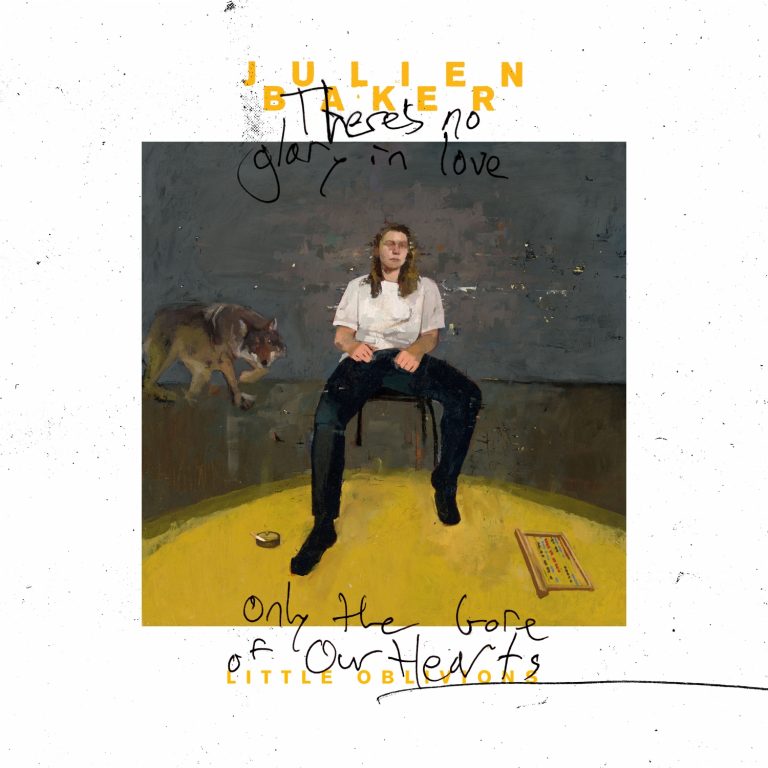Since the release of her bare and devastating 2015 debut album Sprained Ankle, Julien Baker has risen step by step to higher points. Her 2017 follow up, Turn Out The Lights, brought even more applause and acclaim, and the following year she then went on to form the indie supergroup boygenius (with Phoebe Bridgers and Lucy Dacus) and release the equally-renowned boygenius EP. Since then there’s been a couple of 7″s with new songs, a contribution to a Frightened Rabbit tribute album, some vocals leant to songs by Hayley Williams and Touché Amoré, a collaboration with the Manchester Orchestra, and even a festive single in late 2020.
Thus, Baker’s new album Little Oblivions arrives some four years after her last, but she’s hardly been idling. The same goes for her third album too; Baker produced all the songs and most of the musical contributions on the albums she performed herself – guitar to piano, bass to drums. It’s a busy record that marks a shift in sound for her, veering away from the skeletal guitar-and-vocals setup in favour of busy backdrops and full canvases.
It’s hard to deny that Little Oblivions is a sonic a feat: banjo notes sweetly brush against the edge of the arrangement on “Heatwave”; the guitar of “Crying Wolf” sounds like it’s getting lost in a cavern before a ghostly choir of backing vocals falls into the mix; and opening track “Hardline” announces itself with flashes of fuzzy guitar before it bends creaking synths into the angular staccato chords. The album is rich and full of music, and in many regards it’s the inevitable continuation of Baker’s sound, which has been adding more and more to the mix as she progressed.
And yet, the consequence of this shift is that the devastating blow of Baker’s voice is dulled. The guttural yearn and cry for help that defined her early songs are missing. The panicked desperation of “Something” or the final sustained note of “Claws In Your Back” (or any other moment from her previous albums that were affecting enough to make you stop whatever you were doing and just listen as the words turned your blood cold) aren’t here, which will no doubt disappoint some. There are still rises and crescendos to be found, like at the ached crash of noise on “Hardline” or the dissolving chants of “Repeat”, but the effect is different – lesser.
Different is not necessarily bad. One can credit Baker for reigning in a reliable trope of her music and trying new avenues to elicit the same reaction. The devastation is still there in the lyrics for sure; Baker can still write in that self-deprecating, self-examining way that explores love, faith, addiction, redemption, and isolation in a way that reads like emo journaling on paper, but sounds like definitive statements on the human condition when sung aloud.
Little Oblivions is ripe with quotable lines – “I won’t bother telling you I’m sorry for something that I’m gonna do again” or “It’s too kind of you to say you can help / but there’s no one around who can save me from myself” are just a couple of examples, and there’s no questioning the sincerity with which they are sung. But there’s still something missing here; repeated listens to Little Oblivions don’t allay the feeling that a critical moment has been missed or that it’s lacking something that would make it a defining, impactful listen.
Maybe it’s not a case of something missing – perhaps it’s a case that there’s too much added. Whereas on her previous songs the gut punch came in that stillness of a paused moment, on Little Oblivions it feels like Baker was afraid of leaving any silence to linger. There’s always something happening in the background, be it a sustained vocal note, backtracked guitar notes, or a drum machine skittering away. Sure, it sounds good, but one does listen and wonder if it was all necessary. Even the album’s barest moment, “Song in E”, feels oddly lacking in intimacy, despite the fact it’s little more than Baker’s voice and some piano chords.
All this makes for an album that hits very much in the middle ground. While the heft of Baker’s maximalist approach here might hit hard with songs on their own (particularly “Hardline”, “Bloodshot” with its busy, hurried National-esque drumming, and the Bridgers and Dacus-featuring “Favor” which almost sinks in on itself), as a whole the album almost congeals into moments that all feel inherently similar. Perhaps if a few weaker tracks (particularly those on the back half of the album) were cut then the glazed-over effect would be lessened. But, as it is, Little Oblivions doesn’t so much feel like a step to a higher point so much as a stumble that Baker has made to look as graceful as she can.

